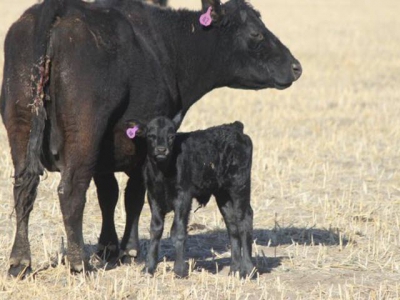Modified grazing may benefit cow/calf producers

Modified intensive early stocking may improve several performance measures for both cows and calves.
Researchers at the Kansas State University Agricultural Research Center in Hays, Kan., have found that a grazing system shown to be beneficial for the performance of steers also has great potential for cow/calf producers.
For several years, beef producers have capitalized on modified intensive early stocking, a grazing strategy that focuses on double-stocking steers in pastures for the first half of the summer and pulling the heavier steers off the grass later in the grazing season, an announcement from Kansas State said.
John Jaeger, a beef cattle scientist in Hays, said much of the research points to the fact that when steers were managed this way, producers reported a 26% increase in pounds of beef produced per acre, and their net returns increased by nearly 19%.
So, Jaeger, range scientist Keith Harmoney and their research team set out to see if modified, intensive early stocking could similarly benefit cow/calf pairs.
“We’ve just completed our fourth year of data collection,” Jaeger said, noting that the project focused on weaning calves from the cow at an average of 150 days of age (the traditional time is 200 days) and increasing the early-summer stocking rate of cow/calf pairs to 1.45 compared to the normal 1.00 rate.
The results were astounding, he said.
“The first and most obvious thing is that we continue to see those early-weaned cows being about a half-body condition score better in October compared to conventionally weaned cows,” Jaeger said.
Further, “the really good news from all this is that they are carrying that added body condition through the winter, and they still have an advantage at calving. The following May, when they are being turned back out, they are still three-tenths of a body condition score better than the cows that were conventionally weaned in October," he added.
The bottom line, Jaeger noted, is that the research is showing an economic advantage for cow/calf producers who are willing to adjust their stocking rates early in the summer, much like what has been shown for many years with steers.
Jaeger said early-weaned calves in the modified early-intensive stocking system “had about a 10 lb., 205-day adjusted weight advantage compared to the season-long stocked calves, and we are getting 1.45 times more calves off the same amount of pasture compared to season-long stocked animals.”
The researchers also noted a benefit in pregnancy rates: Cows in this system had a 10% greater first service conception rate and a 5% greater rate of conception compared to conventionally weaned cows.
“Perhaps one of the largest benefits of utilizing this system is that there was almost no incidence of bovine respiratory disease in calves weaned in late July and early August compared to calves weaned at the more traditional time in October,” Jaeger said.
He added that the researchers believe that warm, dry days and more consistent temperatures in late July and early August play a significant role in helping avoid the higher rates of bovine respiratory disease normally observed during fall weaning.
The results are “something that can be beneficial if a producer is retaining ownership on those calves,” Jaeger said. “Early-weaned calves that get a higher energy diet early in life tend to grade better, so if the cow/calf producer is retaining ownership, they should see those benefits in their grid payouts.
“In addition, by weaning late July or early August, if a producer is not retaining ownership, they have the potential of selling those calves before we see the traditional dip in the market when the majority of calves are being weaned.”
Many factors are involved, including weather and the availability of forage, but Jaeger said the research points to an economic opportunity for beef producers.
Related news
 Flaxseed additives may boost dairy cow health, milk production
Flaxseed additives may boost dairy cow health, milk production Adding rumen-protected flaxseed to dairy cow diets may improve health, increase the nutritional value of milk and boost milk production, says researcher.
 Encapsulated additives may boost meat tenderness in feedlot cattle
Encapsulated additives may boost meat tenderness in feedlot cattle Adding a blend of encapsulated feed additives with clove and rosemary essential oils may improve the tenderness of meat from grain-fed cows without changing
 Veterinary study aims to reduce calf pain during difficult births
Veterinary study aims to reduce calf pain during difficult births Dr. Jennifer Pearson, a veterinarian pursuing doctoral studies at the University of Calgary Faculty of Veterinary Medicine (UCVM)